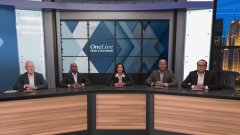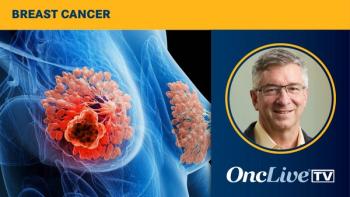
Addressing Disease Progression on ET: Data Updates and Ongoing Trials
A focused discussion on trials that may address disease progression on first-line therapy, including those on ET and CDK4/6 inhibitor rechallenge and novel combination strategies.
Episodes in this series

Transcript:
Komal Jhaveri, MD, FACP: At the ASCO [American Society of Clinical Oncology] meeting this year, they presented data from the MORPHEUS study [NCT04802759]. Do you want to tell us about that study? What do you think about those data and how will that be relevant in our second-line setting?
Aditya Bardia, MD, MPH: Yes, in principle, it was similar. The MORPHEUS trial looked at giredestrant in combination with CDK4/6 inhibitor and showed that it was safe and well tolerated and provided preliminary evidence of efficacy. So in the future we’ll see giredestrant use maybe in a randomized trial in a first-line setting besides palbociclib. That’s the only one we’ve seen so far. MORPHEUS has multiple arms. In the future we’ll probably see everolimus and alpelisib as well. In the second-line-plus setting, endocrine combination from a disease-controlled perspective might provide higher efficacy. The downside is toxicity, because when you add more agents, you also add to the toxicity, including toxicity with alpelisib or toxicity associated with everolimus.
Komal Jhaveri, MD, FACP: Is that a patient where you would continue CDK4/6 and re-challenge them with the CDK4/6 beyond progression in the first-line setting?
VK Gadi, MD, PhD: I think if you have evidence that there is a driver of why this drug therapy failed a patient in that first line, you got to chase that evidence. By that I mean you checked for an ESR1 mutation, you found one, you’ve checked for a PIC3 mutation, you found something, maybe you even found a HER2 mutation, right? Whatever it is, we know that in that setting, the CDK4/6 inhibitor class of therapies is doomed to fail unless you address that other mutation. So that would be the caveat, but for all-comers where that’s not the case, and that might be as many as 60% of the patients, yeah, it’s an open question.
We’ve seen some data now—and in particular we have 2 studies that show that this continuation—if you change up the endocrine partner but keep the same CDK4/6 inhibitor, namely palbociclib, that doesn’t work, right. The palbociclib did not help in that setting. But when you change the endocrine therapy partner and the CDK4/6 inhibitor through the maintained study, we learned you can maybe see a benefit. These are early days [and] small studies, [but] we need more robust data in this space. It’s intriguing to think that there might not be cross-resistance with the CDK4/6 inhibitor class, but you have to consider what the endocrine partner is there as well. It’s a whole sort of change of these things, and now we’re going to have more tools so we can ask these questions with these novel drugs that target the endocrine axis, and then start looking at what the CDK4/6 axis is doing as well.
Komal Jhaveri, MD, FACP: Absolutely. I think it’s going to get more complicated, is what you’re trying to tell me. We are now going to wait for more randomized data to see if we should really continue CDK4/6 inhibitors or not. We’re going to wait [for] data from the postMONARCH [trial; NCT05169567] that is looking at fulvestrant plus abemaciclib vs fulvestrant. We have EMBER-3 [NCT04975308], which is looking at oral imlunestrant, where patients will either get imlunestrant vs physician choice or they could get imlunestrant plus abemaciclib. So we’ll have that as well. That could be potentially for your PI3 nonaltered patients, maybe ESR1 mutant, [or] maybe not. If it’s an oral SERD, we’ll see [that] an appropriate patient can still continue to get elacestrant alone, but we really, today, do not know what we want to do. We also heard data for the CAPItello-291 study [NCT04305496]. Tell us how that will complicate the scenario even more.
VK Gadi, MD, PhD: Now we’re talking about AKT inhibitors and, essentially, we now have a molecule given in an unusual manner. It’s not a continuously used molecule to sort of avert some of the toxicities from drugging this pathway. We have positive data. It’s been in some of this data [that] has now been published in the The New England Journal of Medicine and other places. What we’re seeing is numbers that really evoke stronger signals than what we saw with everolimus when it got its approval in this setting. Potentially even the PI3K inhibitor with what’s being purported to be a better toxicity profile with respect to things like hyperglycemia, etc, those fearful toxicities. So, we’ll see the drugs not approved, but if it does we have an yet another way to drug that PI3K/AKT/mTOR pathway. It’s nice to have that optionality.
So we’ll see if we can partner with the endocrine therapy and rescue some of these patients who might have activating mutations along that pathway. I will just opine: ASCO 2023, in terms of endocrine therapy, positive disease, hormone-positive disease—I’m actually unlearning stuff; it’s becoming more complicated. Conferences like this where we talk about these things, I think are very helpful. You know, it just goes to show that for our community partners who are in this trying to tackle these diseases, there’s going to be a lot of education that needs to take place. If it’s complicated for us, you can only imagine for folks who are seeing so many different diseases trying to keep all of this together. It’s very challenging.
Komal Jhaveri, MD, FACP: Yes, I know. It is very challenging.
Transcript edited for clarity.
Clinicians referring a patient to MSK can do so by visiting msk.org/refer, emailing referapatient@mskcc.org, or by calling 833-315-2722.





































